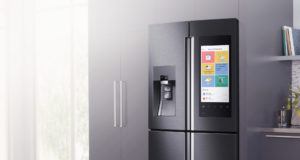Food for thought: Should you buy a smart refrigerator?

Samsung’s Family Hub Refrigerator comes with a steep price tag (~$6,000), but are there other hidden costs? What does a smart refrigerator really buy you?
Samsung Electronics is a global market leader for high-tech electronics and appliances. Its product line spans a range of mobile devices, digital consumer electronics, infrastructure, and home appliances. Recently, digitization has provided opportunities for Samsung to expand its business model and innovate in product categories such as home appliances. The introduction of its latest Family Hub Refrigerator is an example of Samsung’s innovation in the Internet of Things (IoT) space. Samsung has used technology to upgrade a central appliance found in every home, “transforming the communal kitchen experience for consumers in ways that will re-define how they view and use their refrigerator.” [1]

For Samsung, the benefits of a smart refrigerator are clear: Home appliances are not exactly the most sought-after items on anyone’s gift list. For years, refrigerators were seen merely as functional appliances with little potential for upsell or repurchase. Samsung has taken a mundane purchase from a need to a want. Furthermore, Samsung has the opportunity to create a completely connected home – from other kitchen  appliances to televisions, security systems, etc. Samsung stands to gain from this connected ecosystem, especially since most consumers will remain loyal to a single brand if converting their entire home given the ease of connectivity among all smart appliances.
appliances to televisions, security systems, etc. Samsung stands to gain from this connected ecosystem, especially since most consumers will remain loyal to a single brand if converting their entire home given the ease of connectivity among all smart appliances.
Kitchen appliances were typically considered time saving goods, whereas entertainment products are considered time using goods. Digitization and the introduction of smart kitchen appliances has started to blur the lines between time saving and time using goods. In the future, there will be more competition for how much time people allocate to the use of each, especially as time saving goods become more like time using goods. [2] By selling a breadth of products that span across time saving and time using goods, Samsung should be well-protected against this competition over consumers’ time.

But for the consumer, what are the benefits of a connected kitchen? Having a smart refrigerator like Samsung’s Family Hub allows you to see inside your refrigerator from anywhere via its advanced cameras that capture images every time the door closes. This allows consumers to track what they have in the fridge and what they need to buy at the grocery store. For children or elderly people who might overlook expiration dates, smart refrigerators can help manage this by sending alerts of what should be thrown out. You can even link the Family Hub refrigerator to online grocery shopping and recipe applications. There seem to be further opportunities to integrate this technology with an Amazon-Echo-like product that would automatically re-order certain products when they reach low levels as detected by your refrigerator. Samsung’s Family Hub also features a large tablet-like interface on the front that essentially replaces the need for magnets and papers to remind the family of important upcoming events. [3] This all sounds great, right?
But what about the costs? Aside from the steep price tag of ~$6,000 (as compared to an offline version that costs as little as $500-$1,000), smart refrigerators pose another potentially costly challenge. Like our smartphones, frequent software updates fix everything from annoying bugs to major vulnerabilities. Smart appliances are prone to the same cyber security risks, especially when personal calendars and email are linked to the devices as in the case of Samsung’s Family Hub fridge. [4] One way to mitigate the risk of hacking is to ensure that you use different internet connections across your various smart devices. [5] In addition to malware and security issues, there is increased risk of spying and robbery. Smart refrigerators capture a lot of data about usage patterns that could clue others into what time you wake up in the morning (grabbing milk for your coffee) and leave the house for work (grabbing your lunch bag), when you return home in the evening (taking ingredients out for dinner), what time you go to bed (shortly after putting that tub of ice cream back in the freezer), and when you might be out of town for an extended period of time (fridge remains shut for several days). [6] If this information got into the wrong hands, there could be physical risks to your home. These security risks expose consumers with smart appliances to additional vulnerabilities that might not be worth the aforementioned benefits.
—
While the actual price tag of smart refrigerators and other similar digital home appliances is likely to drop over time, as technology products have in the past, there are real concerns about security as it relates to IoT and digitalization in the home. Samsung and other companies that provide these new, cutting edge technologies should help equip consumers with the required monitoring systems to keep them safe. For example, Samsung should find a way to push software updates automatically to its smart appliances to ensure consumers are protected at all times.
[Word count: 798]
Sources:
[1] “Samsung Introduces an Entirely New Category in Refrigeration as Part of Kitchen Appliance Lineup at CES 2016,” Samsung press release (USA, January 6, 2016).
[2] Richard Harper, ed., Inside the Smart Home (London, England: Springer, 2003), pp. 31-36.
[3] Lisa Eadicicco, “Behold Samsung’s New $5,800 Smart Refrigerator,” Time (May 4, 2016), http://time.com/4318290/samsungs-smart-refrigerator-family-hub/, accessed November 2016.
[4] Chris Hoffman, “Why buying a smart fridge is a dumb idea,” How to Geek (blog), July 9, 2016, http://www.howtogeek.com/260896/why-buying-a-smart-fridge-is-a-dumb-idea/, accessed November 2016.
[5] Kari Paul, “7 ways to keep your smart home from being hacked,” MarketWatch (October 20, 2016), http://www.marketwatch.com/story/7-ways-to-keep-your-smart-home-from-being-hacked-2016-10-17, accessed November 2016.
[6] Joseph Steinberg, “These Devices May Be Spying On You (Even In Your Own Home),” Forbes (January 27, 2014), http://www.forbes.com/sites/josephsteinberg/2014/01/27/these-devices-may-be-spying-on-you-even-in-your-own-home/#48df01dd6376, accessed November 2016.
Image sources:
[1] Samsung, “Family Hub,” http://www.samsung.com/global/ces2016/familyhub/, accessed November 2016.



Hi Scuba Steve,
Great posts really showing the potential amazing benefits and risks around IoT and in this case, a fridge that costs 5-10x the price of a non-IoT fridge.
In terms of security, Samsung could create a closed system, or an intranet in which only you hold your data, and any data given to external sources would be token-ized, similar to that of apple pay. However, using this type of closed source system would exclude partners of Samsung to utilize data, and would close down the ecosystem to either Samsung products or products made with the Samsung system integrated into it. Apple has gone this route with it’s “Homekit” system and as a result, their ecosystem is tiny, especially compared to Google’s Home ecosystem which contains far more brands and products.
Do you think this closed ecosystem is the future, due to security concerns or a more open one where security might be more suspect. If it is closed, can Samsung really play in this IoT space, since they cannot make EVERY product someone might want connected to their house. However, if they lose control or are unable to gain market share in their ecosystem, they might have to pay to join someone else’s closed ecosystem and of course risk the other ecosystem not letting them in or dropping them at some point.
I am very interested in seeing how the IoT ecosystem is created over the next few years and how Samsung and their fridge will play a part!
I saw one of these the other day and was wondering how they worked – thanks for the update!
You raised some great points, your one comment about elderly people getting sick from eating expired food really resonated. That was a particular challenge that we had to manage with my grandparents, unfortunately they would often lose track of how long things had been in the fridge and would get really sick as a result.
You did a great job articulating the functional benefits of the fridge, but I wonder whether items like this are truly bought for rational, functional purposes or – to use the Patented Donald Concentric Circle Framework – whether there’s some ego-expressive conspicuous consumption going on here. I think appliances like this make for great talking points for guests on top of all the other benefits they provide.
The network effects seemed really pertinent – do you know if the fridge has any additional functionality with the Samsung smartphone platform? Are Samsung working on developing other appliances in the same “smart” vein?
Your point about security is well taken and will no doubt play a bigger role as penetration of these appliances increases. Although I do wonder whether malefactors wouldn’t be better off going through household garbage to find personal information that they could leverage – or using social media to get an idea of when you might be out of town. It seems to me that there’s lower hanging fruit for identity thieves and other troublemakers.
Thank you for your post! I do think there are some clear benefits to consumers. However, I am still wondering how Samsung will deal with the risk of technology obsolescence. Similar to the iPhone, will consumers need to buy a new refrigerator more often? Given the hefty price, will consumers be willing to purchase an appliance that may be dwarfed by other competition in the future given that there will be significant upgrades in the future (voice control, etc)? It would also be interesting to know more about how Samsung is able to track expiration dates for each product in the refrigerator given that this seems to be a very important feature for consumers.
I think the transition to smart refrigerators made sense for Samsung – it fit with the rest of their business model. However, I’m not sure they offered functional benefits that customers actually wanted. For example, you mentioned that this refrigerator is probably helpful for senior citizens and children who aren’t as mindful of expiration dates. However, this requires that both types of people are capable of handling smartphones extremely well, too. In addition, what worries me is that the expiration dates are only inputted into the refrigerator after someone physically scans them in. If I buy 50 pieces on my grocery run and have to scan all of that, I’m not sure I would…
There is huge potential to have a connected house that is integrated into every other aspect of your digital life. A huge barrier would be how should companies cross the barrier of trust requirement to enable users to take up these technologies on a large scale. Recently there was an incident of a Nest camera being hacked. Many users would not feel very safe using such technologies. Companies would need to first demonstrate strong ability to manage security risks and then an ability gain and retain customer trust.